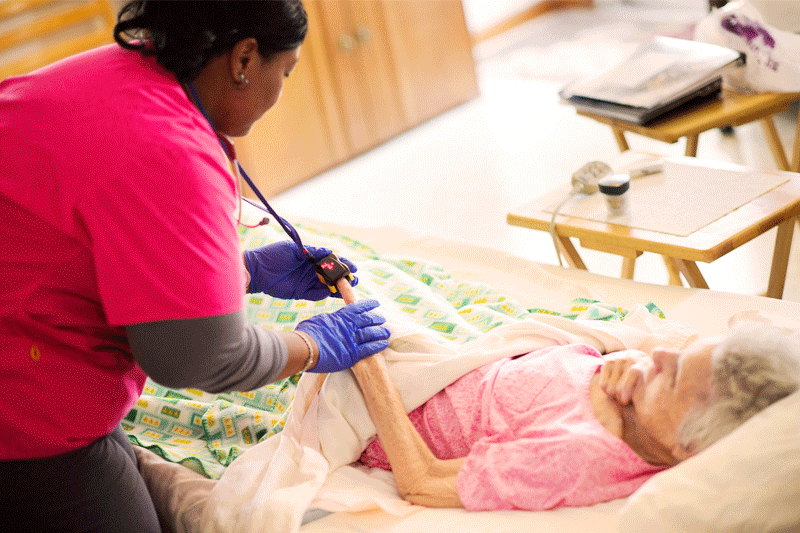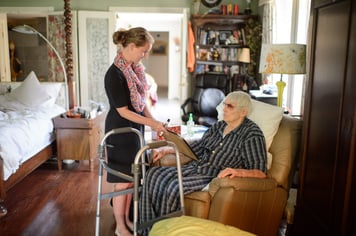Palliative care is a type of specialty care. It focuses on improving quality of life for people with serious illnesses. Your primary care doctor and other palliative care team members work together to coordinate your care. Palliative care also helps ensure that your care controls symptoms like pain, and that it helps with all physical, mental, emotional, and spiritual needs.
With palliative care, you can receive support in managing serious chronic illnesses such as:- Dementia
- Cancer
- Heart disease
- Amyotrophic lateral sclerosis (ALS)
- Cystic fibrosis
- End-stage liver disease
- Kidney failure
- Lung disease
- Parkinson's disease
- Stroke
[action 1]
It is provided by a trained team of physicians, nurses and other providers such as social workers, spiritual advisors, and trained volunteers. The palliative team also makes sure that patients and their families have input in the direction of their care, and that the forms of treatment match their personal goals.
The Objectives of Palliative Care
Palliative care works to:
- Maximize quality of life.
- Provide relief from pain and other physical symptoms.
- Provide emotional, psychosocial and spiritual care.
- Provide support, aid and education to the family and caregivers for the duration of the patient’s illness.
Palliative Care Misconceptions
Palliative care is often misunderstood , with many believing that it is only for those living with a late stage or terminal illness, or that it is the same or similar to hospice care.
While palliative care is a part of hospice care, the treatments and supports that palliative care focuses on can be provided along with the treatment of any serious or advanced illness. This is best started at the time a person receives a diagnosis.
Unlike hospice, palliative care can be put in place at any stage of an illness, is not based on prognosis, and can be received even if your treatment is intended to cure your condition.
With the support of palliative care, patients may actually go on to feel better, continue performing activities of daily living, resume or continue working, and, depending upon the illness, potentially even recover.
During this time, if the palliative care team or the patient’s physician determines that the ongoing treatment is no longer controlling the illness, a transition to hospice care may be an option for the patient. This means that:
- A doctor certifies the patient’s lifespan is limited to 6 months or less.
- The care team places a heavier emphasis on comfort care.
Where is Palliative Care Provided?
Care teams may provide palliative support in different settings based on the patient’s desires and specific medical needs. These may include:
- Hospitals
- Specialized clinics
- Hospice programs
- Nursing homes
- In the patient's home or the home of a family member
In many cases, patients or their family members decide to receive palliative care in the patient’s home. This way, the patient can get the highest level of support and medical care while surrounded by loved ones in the comfort of their own home.
How Palliative Care Helps Patients
Palliative care addresses many possible services for both patients and their caregivers as their illness or palliative care needs change. These are some ways palliative care helps patients:
Creating the Right Care Plan
The patient, their loved ones and their health care team work together to develop a plan of care that focuses on the patient's quality of life. It should be flexible to provide the right care as the illness changes.
Support, Guidance and Advice
Palliative care services include help navigating the many difficult decisions patients and their families may face when dealing with a serious illness. Palliative care team members help patients and families deal with stress, spiritual questions, financial concerns, and bereavement and coping skills. They will offer guidance, support and connection with necessary community resources to help everyone involved in this journey.
Ongoing Management
Nurses and physicians work together to review the patient’s symptoms, prescriptions, and look at the patient’s changing needs. The goal is to make sure the patient stays as comfortable and independent as possible. Services such as home health care may be set up to provide support for self-care and activities of daily living.
Late-Stage Illness Care
This may involve setting up inpatient care at a hospital if needed. It can also assist in transitioning to hospice, which can be provided at home, if requested for end-of-life support. For eligible patients, hospice care helps ensure the patient gets the support they need, without moving out of their familiar surroundings.
How Palliative Care Helps Families and Caregivers
Supporting families and caregivers is a big part of palliative care. This type of care recognizes that these people are an important part of a patient’s life. It also understands that they need emotional, physical, social and spiritual help during this process. They are often strongly impacted by challenges can happen during a patient's illness, and will need advice and guidance.
These are some palliative care goals of supporting families and caregivers :
- Teach skills to manage the patient’s care at home
- Relieve emotional distress
- Provide resources for community support
- Help with referrals to medical and mental health services for the patient as needed
- Help with end-of-life planning and discussions
- Assist with spiritual needs
- Support self-care strategies for those providing care
When Should Patients Begin Palliative Care?
There’s no set point where palliative care should start, however the earlier a person seeks support the better. A patient that has been diagnosed with a serious long-term or life-threatening illness will see important benefits from palliative support. The sooner this is started, the better they can control the negative effects of their disease.
Complete our brief form below if you'd like to contact our palliative care team.
Resources:
- NIH: Palliative Care: https://www.nia.nih.gov/health/what-are-palliative-care-and-hospice-care
- Get Palliative Care: https://getpalliativecare.org/whatis/
- Mayo Clinic: https://www.mayoclinic.org/tests-procedures/palliative-care/about/pac-20384637




